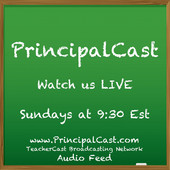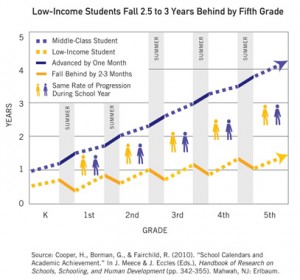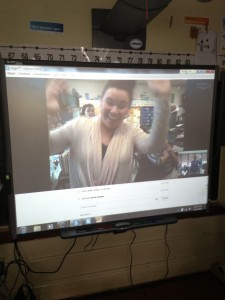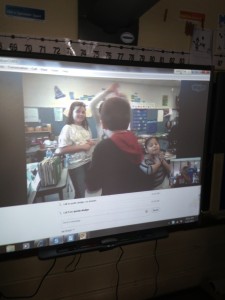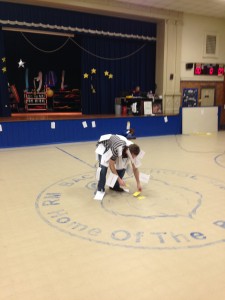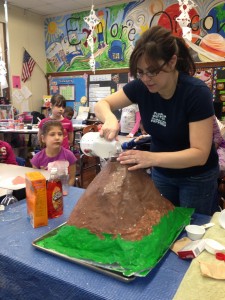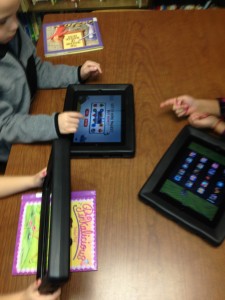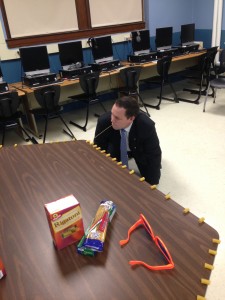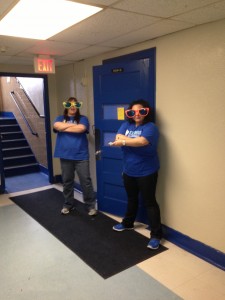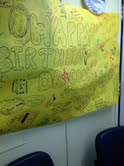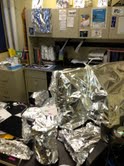Project Based Learning : Real Questions. Real Answers. How to Unpack PBL and Inquiry.~ Ross Cooper and Erin Murphy

Author Erin Murphy with a copy of the book!
If you are looking for a boring educational book then this book is not for you! In Project Based Learning: Real questions. Real Answers. How to Unpack PBL and Inquiry, Ross Cooper and Erin Murphy have assembled a very interactive and engaging book designed to help educators transform learning for our children.
Right from the beginning Cooper and Murphy start with WHY. How important is this? Well, there has been extensive research showing that any new learning needs context so if you start with the why then you are on the path! Cooper and Murphy discuss their perspectives as learners and then go into a chapter that is filled with supporting details and research.
As a parent of two daughters, I worry about the educational systems that might make my daughters or any child, feel that learning is just about moving information from a textbook to a worksheet rather than the thrill of discovery ~ Erin Murphy
After they discuss the why, Cooper and Murphy take the reader on the road to how. As professional development experts, they discuss how they have implemented it and more importantly, trained others to use it in their classrooms. They suggest a three step process to implementing PBL in the classroom:
- Plan with the end in mind.
- Plan the assessments.
- Plan the teaching and learning.
Cooper and Murphy provide charts, graphs and narratives describing the process with such clarity that you will feel fully supported during your journey!
Throughout the remainder of the book, Cooper and Murphy help practitioners tackle difficult subjects such as grades, conferencing, direct instruction and working with colleagues during the process. According to Cooper, “I was given a copy of Fair Isn’t Always Equal by Rick Wormeli as a administrative intern. Unfortunately, I put it on my bookshelf and didn’t get back to in until I became an assistant principal. Once I read it, I was floored by the ways the author’s ideas and philosophies disagreed with my own. I realized that my practices and the research were out of line. I committed many classic mistakes such as averaging grades, grading group work and forcing students to adhere to strict deadlines when handing in assignments.” As you can see, the authors are committed to Reflective Practice and sharing their growth with the reader!
Assessment says, “I want to help you,” while grading says, “I want to judge you.” ~ Cooper and Murphy

Photo by William Iven on Unsplash
The concluding chapters of the book help the reader with the heavy lifting. How are you going to build a PBL culture? I was really impressed that they spent a huge segment of the book addressing culture. As one of my favorite Peter Druker quests came to mind, “Culture eats strategy for breakfast.” Cooper and Murphy provide a great deal of support to the notion of prioritizing students over the curriculum as well as having a growth mindset about the process. Often times, as they point out, PBL can appear chaotic with the control of the learning squarely on the learner’s back. Cooper and Murphy will not only help you with managing the chaos, they also provide research-based support systems to ensure that learning is occurring during the entire process. These support systems can help with administration, parents or critics who wonder… what is even going on in there?
If you are considering Project Based Learning, I highly recommend this book. Cooper and Murphy’s process will ease any anxiety you have about switching the learning to the students. Then, as you implement the process, the authors will be a tweet away for support.
Continue the learning with PBL and connect with Ross Cooper and Erin Murphy on Twitter.
 About the Author
About the Author
Spike Cook, Ed.D., Principal, Lakeside Middle School, Millville, NJ. In addition to being a Principal, Dr. Cook published two books through Corwin Press (Connected Leadership: It’s Just a Click Away; Breaking Out of Isolation: Becoming a Connected School Leader). He is the co-host of the popular PrincipaPLN podcast and his blog, Insights Into Learning, was recognized as a finalist for Best Administrator Blog by the EduBlog Awards. Spike earned his Doctorate from Rowan University and is featured in their Alumni Spotlight. He is featured in Twinkl’s 30 Education Influencers You Need to Follow and Klear’s Top Ten Middle School Influencers. Dr. Cook is also on the Education Advisory Board for Whole Health Ed. Connect with @drspikecook via Twitter, LinkedIn, Facebook or Instagram.
